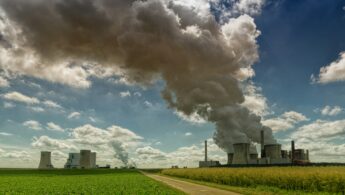Why measuring methane matters
Methane emission rates reported by major oil and gas companies are 94% lower than indicated by independent estimates of the…

This paper was produced in collaboration with Strategic Perspectives. It intends to contribute to the next steps of the global debate of how to transition away from fossil fuels as agreed at COP28 by proposing scenarios, recommendations and reflections on targets for phasing out the extraction of oil and gas.
Upcoming meetings of the G7 and G20 can discuss what a fossil fuel phase out in “a just, orderly and equitable manner” means, building momentum for countries to include fossil fuel phase out commitments in their updated climate targets, ahead of the climate summit in Brazil in 2025.
The scientific evidence is unequivocal, the next years are crucial to keep the 1.5°C temperature goal enshrined in the Paris Agreement within reach. The UN’s Intergovernmental Panel on Climate Change (IPCC) has stated clearly that global greenhouse gas emissions need to peak before 2025 and be reduced by 43% by 2030.
Fossil fuels are the major contributors to global warming, a fact finally recognised by all countries at COP28, which agreed to “Transitioning away from fossil fuels in energy systems, in a just, orderly and equitable manner, accelerating action in this critical decade, so as to achieve net zero by 2050 in keeping with the science”.[1]UNFCCC “Decision CMA.5, Outcome of the First Global Stocktake.” UNFCCC, 2023.
There is a clear urgency to set transition pathways to drastically reduce fossil fuels: Projected cumulative future CO2 emissions from existing fossil fuel infrastructure would already exceed the remaining 1.5°C carbon budget, unless they are abated.[2]IPPC, “Climate Change 2023: Synthesis Report: Summary for Policymakers.” IPCC, 2023.
Business as usual is thus not an option. To stay within a 1.5°C carbon budget, 40% of ‘developed’ reserves of coal, oil and gas would need to be left unextracted. Developed oil and gas fields alone account for more than four fifths of the 1.5°C budget.[3]Trout, K. et al. “Existing fossil fuel extraction would warm the world beyond 1.5°C.” Environmental Research Letters, 17, no. 6 (2022).
Oil and gas production should decline by 15% and 30%, respectively, by 2030 and 65% by 2050, compared to 2020 levels, according to analysis of feasible 1.5°C scenarios by the International Institute for Sustainable Development.[4]Bois von Kursk et al, “Navigating energy transitions: Mapping the road to 1.5°C.” IISD, 2022.
Existing fossil fuel extraction projects are already sufficient to meet demand in scenarios where warming is limited to 1.5°C.[5]Green F.et al. “No new fossil fuel projects: The norm we need”, Science, May 2024. Any new oil and gas extraction projects would exceed this, putting the temperature goal of the Paris climate agreement at risk.
Unless meaningful policy measures and finance decisions are taken, governments could produce around 110% more fossil fuels in 2030 than would be consistent with limiting warming to 1.5°C.[6]SEI, Climate Analytics, E3G, IISD, and UNEP. “The Production Gap: Phasing down or phasing up? Top fossil fuel producers plan even more extraction despite climate promises.” UNEP, 2023. This makes it evident that current trajectories for oil and gas production are completely incompatible with the goals of the Paris Agreement. Instead, all countries can be encouraged to set out their plans to transition away from fossil fuels in their next round of updated Nationally Determined Contributions (NDCs), due in 2025.
Without action, oil and gas production is forecast to be 29% and 82% higher, respectively, than the median 1.5°C pathway in 2030. By 2050, the respective percentages will grow to 260% and 210%.
Defining just, orderly and equitable transition pathways is thus imperative. This discussion is happening at a time when extreme climate events are breaking records, making it evident to citizens and leaders that climate action is inevitable and urgent. These extreme climate events affect vulnerable communities the most and become a great obstacle in reducing inequalities.
The economics continue to be made to favour oil and gas production and consumption. Global fossil fuel subsidies amounted to USD 1.6 trillion in 2022, according to the OECD and IISD.[7]OECD & IISD “Fossil Fuel Subsidy Tracker.” Accessed June 2024. It is high time to implement the agreement at COP28 to “Phasing out inefficient fossil fuel subsidies that do not address energy poverty or just transitions, as soon as possible”.[8]UNFCCC “Decision CMA.5, Outcome of the First Global Stocktake.” UNFCCC, 2023.
A transition away from fossil fuels is still hindered by countries each trying to benefit from their resources the longest rather than working towards a collectively managed transition. But this approach is misguided as the economic benefits of fossil fuel production will be limited and diminishing as the energy transition accelerates. If all countries seek to maximise oil and gas production in the face of falling demand, the economic and social costs of the transition will increase.
Oil firms and investors also face significant risks from the energy transition, with the total value of stranded assets under a scenario where warming is limited to 2°C estimated at USD 1.4 trillion.[9]Semieniuk, G., Holden, P.B., Mercure, JF. et al. “Stranded fossil-fuel assets translate to major losses for investors in advanced economies.” Nat. Clim. Chang. 12, 532–538 (2022).
Instead of competing for the perceived benefits of oil and gas extraction, countries can collaborate to agree on principles for a just and equitable fossil fuel phase out that reduces the economic and social impacts of any delays. Without coordination and effective policies, these climate impacts will end up being disproportionately borne by the poorest, most marginalised and least able to transition. Some initiatives such as the Beyond Oil and Gas Alliance and the Fossil Fuel Non-Proliferation Treaty have proposed approaches to this end.
Multilateral forums such as the G7 and G20 can discuss what a fossil fuel phase out in “a just, orderly and equitable manner” means, building momentum for countries to include fossil fuel phase out commitments in their updated climate targets, ahead of the climate summit in Brazil in 2025. Following the scientific evidence would require immediately halting the opening of new oil and gas fields as a first step.
A variety of approaches have been identified to achieve a fossil fuel phase out, many of which share significant commonalities around the principles of justice, fairness and alignment with the Paris climate agreement and climate science.[10]While broad agreement on the importance of an equitable phase out between countries, different methodologies have been proposed for assessing the responsibilities and capabilities of individual … Continue reading The majority cite one of the foundational principles of the UNFCCC process – that of common but differentiated responsibilities and respective capabilities.
As an example, assessing countries by their ability to finance the transition – measured in GDP per capita and the extent to which government income comes from oil – shows that countries like the UK, US and Canada would face relatively low challenges to transition (according to these criteria) and have significant financial capacity for it. Whereas countries like Iraq, Congo and Equatorial Guinea face significant challenges and have little financial resources to mitigate the impacts of the transition (see Figure 3).
A recent study, endorsed by over 200 organisations including Climate Action Network International and the International Trade Union Congress produced a comprehensive approach to assess which countries are least socially dependent on fossil fuel extraction. The study – the Civil Society Equity Review[11]Civil Society Equity Review, “An Equitable Phase Out of Fossil Fuel Extraction.” Civil Society Equity Review, 2023. – identifies three criteria:
Underpinning this analysis is the principle that the pace of the phase out should be driven by reducing the social costs and maximising the social benefits of transition, rather than purely by a country’s stage of development or historic responsibility.
The two tables below highlight options of what just, orderly and equitable transition pathways could look like. They can form the basis for a discussion in multilateral forums such as the G7 and G20 and UNFCCC on what criteria should be used to assess a just phase out of fossil fuel production.
As well as defining what just and equitable approaches mean, agreement on the financial support to get there would be critical to a successful implementation. Multilateral conversations can therefore focus on developing principles and pathways that are just and equitable, matched by financial support for those countries that need it. This would reflect countries’ capacities and constraints, the necessity to provide finance, as well as predictability for workers and communities.
A range of proposals are on the table on climate finance, among them the necessity for Developed Countries (defined as Annex I countries under the UNFCCC) to provide support and the suggestion that countries with the greatest ability to pay (defined as those with per capita capacity above the global average) contribute. More recently, there have been calls for the fossil fuel industry to pay for climate finance, as proposed by the EU, and the idea of a fossil fuel levy by incoming COP29 presidency Azerbaijan.[12]John Ainger, Jennifer A Dlouhy and Akshat Rathi, (2024, May 30) “COP29 Host Azerbaijan Working on Proposal to Levy Fossil Fuels.” Bloomberg News.
A broader reform of financial systems that includes the international financial institutions is also under way – and will be critical – but progress has been too slow given the resources needed. The economic and financial opportunities resulting from a transition to climate neutrality can only be unlocked in low-income countries with access to sufficient finance and if debt no longer stands in the way of sustainable development.
The scale of existing climate finance is estimated at USD 1.3 trillion annually, according to the Climate Policy Initiative.[13]Buchner, B. et al, “Global Landscape of Climate Finance 2023.” Climate Policy Initiative, 2023. This is still less than the USD 1.5 trillion paid in direct fossil fuel subsidies among 82 of the largest economies in 2022 (OECD).[14]OECD, “Cost of Support Measures for Fossil Fuels Almost Doubled in 2022 in Response to Soaring Energy Prices.” OECD, 2023. It is also just over half of the USD 2.4 trillion green transition investment required annually through 2030 in emerging and developing countries (other than China), according to the UN’s high level expert group on climate finance.[15]Independent High-Level Expert Group on Climate Finance, “Finance for climate action: Scaling up investment for climate and development.” LSE, 2022.
The G20 and G7 can play important roles in the process of creating financial mechanisms to allow low-income and vulnerable countries to decarbonise their energy systems and adapt to the impacts of an increasingly extreme climate. COP29 should result in a new collective quantified goal (NCQG) on climate finance that addresses mitigation, adaptation, and loss and damage.[16]UNFCCC, “From Billions to Trillions: Setting a New Goal on Climate Finance.” UNFCCC, 2024.
Managing local needs and collective action requires a combined bottom-up and top-down approach to define a just, orderly and equitable transition away from fossil fuels. The run-up to COP30 is the time to make progress on setting out pathways to transition away from fossil fuels. The G7 and G20 summits in June and November 2024, respectively, offer key touchpoints to lay the foundations for global action on the transition away from fossil fuels. These summits offer the opportunity for major economies to signal their intent to phase out oil and gas production, and begin building international consensus around how to ensure that it is just and equitable.
Agreements at these summits could lay the groundwork for a bottom-up approach, where countries commit to end the expansion of oil and gas extraction, set fossil fuel phase out dates as well as demand reduction goals for 2035 in their next NDCs, to be submitted 9-12 months ahead of COP30.
The top-down approach can be guidance on what “just, orderly and equitable” means internationally, building on the progress made through countries’ individual commitments. It is vital that new, fossil-free economic models are established globally and alternative income sources found for fossil-dependent economies. This approach should also aim to address any shortcomings in bottom-up targets and ensure these are aligned with what is required to limit warming to 1.5°C and achieve a just transition.
The G7 and G20 have an opportunity to give an impetus to this debate, not least as the high-income countries among their members have a historic responsibility to lead on emissions reduction and provide financial support. Their leadership could pave the way for a broader debate and action in the UNFCCC context.
Widespread support for immediate government action to address climate change exists in most countries, with 71% of people in G20 countries agreeing that action is necessary. Concerns about escalating weather extremes, care for future generations, and dissatisfaction with government inaction are significant elements of messages that drive support for climate action. Research indicates majority support for policies like ending fracking (61%) and phasing out fossil fuels (56%) across G20 countries.[17]Potential Energy “Later is Too Late.” Potential Energy, 2023.
With sufficient global leadership, societal support can be built on the imperative of phasing out fossil fuels to avert current and future climate impacts to protect people and nature. Progressing the debate will be facilitated by global leadership on:
Furthermore, in terms of practical steps, the G7 and G20 can play a crucial leadership role by committing to:
References
| ↑1, ↑8 | UNFCCC “Decision CMA.5, Outcome of the First Global Stocktake.” UNFCCC, 2023. |
|---|---|
| ↑2 | IPPC, “Climate Change 2023: Synthesis Report: Summary for Policymakers.” IPCC, 2023. |
| ↑3 | Trout, K. et al. “Existing fossil fuel extraction would warm the world beyond 1.5°C.” Environmental Research Letters, 17, no. 6 (2022). |
| ↑4 | Bois von Kursk et al, “Navigating energy transitions: Mapping the road to 1.5°C.” IISD, 2022. |
| ↑5 | Green F.et al. “No new fossil fuel projects: The norm we need”, Science, May 2024. |
| ↑6 | SEI, Climate Analytics, E3G, IISD, and UNEP. “The Production Gap: Phasing down or phasing up? Top fossil fuel producers plan even more extraction despite climate promises.” UNEP, 2023. |
| ↑7 | OECD & IISD “Fossil Fuel Subsidy Tracker.” Accessed June 2024. |
| ↑9 | Semieniuk, G., Holden, P.B., Mercure, JF. et al. “Stranded fossil-fuel assets translate to major losses for investors in advanced economies.” Nat. Clim. Chang. 12, 532–538 (2022). |
| ↑10 | While broad agreement on the importance of an equitable phase out between countries, different methodologies have been proposed for assessing the responsibilities and capabilities of individual countries. Proposed criteria include each country’s development according to the Human Development Index, accrued benefit from past fossil fuels production, historical cumulative per-capita production, GDP per capita, and share of GDP per capita derived from non-oil and gas sectors. See Calverley, C. & Anderson K. “Phaseout Pathways for Fossil Fuel Production Within Paris-compliant Carbon Budgets”, University of Manchester, 2022; Civil Society Equity Review, “An Equitable Phase Out of Fossil Fuel Extraction”, Civil Society Equity Review, 2023; Muttitt, G. and Kartha, S. “Equity, climate justice and fossil fuel extraction: principles for a managed phase out”, Climate Policy, vol 20 (2020); Pye, S. et al “An equitable redistribution of unburnable carbon”, Nature Communications, volume 11 (2020). |
| ↑11 | Civil Society Equity Review, “An Equitable Phase Out of Fossil Fuel Extraction.” Civil Society Equity Review, 2023. |
| ↑12 | John Ainger, Jennifer A Dlouhy and Akshat Rathi, (2024, May 30) “COP29 Host Azerbaijan Working on Proposal to Levy Fossil Fuels.” Bloomberg News. |
| ↑13 | Buchner, B. et al, “Global Landscape of Climate Finance 2023.” Climate Policy Initiative, 2023. |
| ↑14 | OECD, “Cost of Support Measures for Fossil Fuels Almost Doubled in 2022 in Response to Soaring Energy Prices.” OECD, 2023. |
| ↑15 | Independent High-Level Expert Group on Climate Finance, “Finance for climate action: Scaling up investment for climate and development.” LSE, 2022. |
| ↑16 | UNFCCC, “From Billions to Trillions: Setting a New Goal on Climate Finance.” UNFCCC, 2024. |
| ↑17 | Potential Energy “Later is Too Late.” Potential Energy, 2023. |
| ↑18 | IEA “Net Zero Roadmap: A Global Pathway to Keep the 1.5°C Goal in Reach.” IEA, 2023. |

Methane emission rates reported by major oil and gas companies are 94% lower than indicated by independent estimates of the…

The EU does not need more gas supplies to meet its 2040 demand, yet many countries are making plans to…